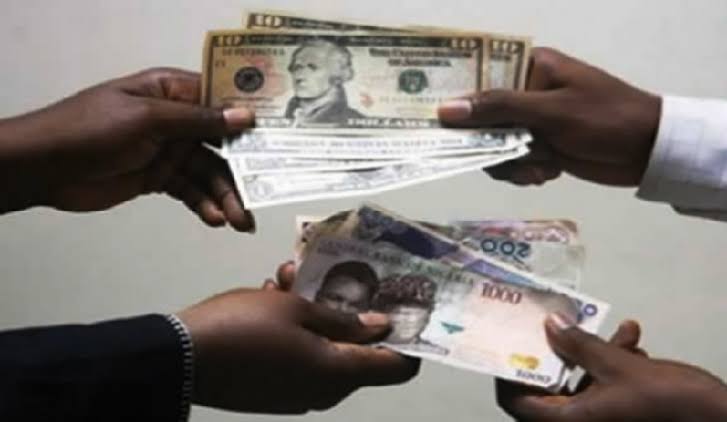Stakeholders in the maritime sub-sector of Nigeria’s economy have condemned in the strongest term, the new benchmark on exchange rate for the importation of goods by the Federal Government, describing the policy as anti-people and capable of destroying trade facilitation.
In fact, they are calling on President Bola Ahmed Tinubu to urgently rescind the policy, if he does not want, by the policy, to snuff life out of the Nigerian people.
The President Tinubu-led Federal Government introduced a new benchmark of N770.88 per dollar for importation of goods as against the previous benchmark of N43.3 pegged by the past administration of former President Mohammadu Buhari.
The new policy has thrown the trading community into confusion as they asserted that they least expected this from the administration they thought would give a beathing space to Nigerians after 8-year of suffering.
Speaking in an interview with our Correspondent, Anefi Mohammed Bayan, a Freight Forwarder said the import duty tax saga was frustrating and capable of not only destroying businesses, but also snuffing life out of the citizens.
Bayan, the Vice President, International Freight Forwarders Association (IFFA), Ports and Terminal Multipurpose Services Limited (PTML) branch said:
“There is no even justification for this. The floating of the Naira with the exchange rate of import duty payment of goods from #423.3 to #770.88 has made a mess of the saying that the President wants the poor to breathe.
“I’m so disappointed right now. A lot of goods are trapped in the port as I am telling you. This is not done anywhere in the world.”
He argued that since the government had removed fuel subsidy, “why floating Naira for import duty payment, thereby making the prices of goods to skyrocket.
He said the President needed to reverse this policy which he described as “obnoxious,” because “the Nigeria government is not paying the cabals from the revenue generated from import duties,” adding that this doesn’t make sense.
“Please ensure that this message gets to the president. He will hear you. It’s a very wrong step he has taken on the import duty exchange rate. The Nigerians he wants to breathe will all die except politicians pay with taxpayers’ money,” Bayan appealed.
“With this, the government should reverse back to #422.3 that the Buhari administration left, which we have hitherto complained about that fell on deaf ears. So many goods are trapped in the port as it’s today July 7, 2023.”
Speaking on the trapped goods, effects on the importers and the buyers, the frontline freight forwarder said that even if the importers manage to source for more money to clear their cargo, the burden of expenses will fall on the final consumer because no manufacturer, producer or entrepreneur will want to sell their products at a loss.
“Nigerians are in for hardship. We are appealing to the government to reverse to N423.3 Even at N423.3, things were already hard in the market. Not to talk about removal of oil subsidy. For you to add to the sufferings of the people.”
“If you jump into increment, the resultant effect will be worse than prior to the increment. The Toyota Corolla vehicle that we do clear with N1 million in the past, when it was N423.3 has gone up to N2million.
“Tinubu administration with this policy, got it wrong. They have to reverse because this has to do with general goods, not only vehicles. It has to do with every good not manufactured in the country that has to come in. This is because it is the exchange rate that determine the amount you have to pay as duty.”
Also speaking, Ismail Aniemu, a Maritime and Public Affairs analyst said that Nigeria economy is import-dependent, as such, whatever is needed to make importation of goods and services to be easier, should be the thrust of government policy.
He said that it was not a bad idea if the government intends to stop importation of foreign goods, adding that what does not make sense is to raise the exchange rate to what it is now.
“If you look at the economy with the new development, importation of goods will reduce, to the business man who deals on importation, the imported goods will be inflated in price to the final consumer. Whether you and I like it or not, the jean that we wear, the electronics that we use, the phones, the gadgets, television you use in your homes, all are imported. That new exchange rate will increase the prices of all these products.”
Aniemu averred that the rate will have a chain effect on the economy.
He said that it would have been advisable to the government to rescind on that policy, go back to old rate, give a buffer period of say 90 days, within which, any one that already have a shipment to Nigeria, would have received the goods.
“Anybody that his consignment has already arrived the port of Nigeria, would clear them, using the old rate within 90days. After 90 days, government can now say the buffer period is over and this is what we intend to do. But coming to take the people unaware is anti-people, it is anti-economy. It will not do anyone good, even the government. This is because if the government raise high revenue at the detriment of the people, the same government will use the high revenue to solve problems it ought to have prevented.”
He said the importation business as far as international trade is concern, create employment for a lot of people and that if the government make so much revenue from it at the detriment of the people, the importer, traders or companies will sack workers.
Aniemu asserted that when these workers are sacked, they come to government for palliatives, poverty alleviation, other incentives, and the government in turn will use the revenue expected to be used for infrastructure development for those things.
“I can also tell you that Nigerians studying abroad are also caught in the middle.
“This is because most of their sponsors are residents here and using the old rate to pay the school fees. With what we have now which is almost 100 percent increase, some of them will either drop out of schools or their supplies and standard of life drop.”
“Though I cannot talk much about those going abroad for education, because they are mostly rich people. But for the on down trodden, poorest among the poor and the trading communities, the government needs to consider rescinding or suspending that policy.
Aniemu maintained that this government policy on importation will not facilitate trade rather it will frustrate it.
“It will frustrate trade, create unemployment, crate inflation, this is because we are running an import-dependent economy. The hardware we use are not manufactured here. All these things are essential. Machines, spare parts, vehicle parts, even accessories of other gadgets are all imported. So, if you increase their prices in the market and you have little money chasing many things to buy, poverty will increase, unemployment will increase. It is generally going to anti-people. Why I brought in education is because it will be another difficult situation for people in that area. But those in foreign education are not the poor. So, if you increase exchange rate for education, don’t increase it for importation.”












